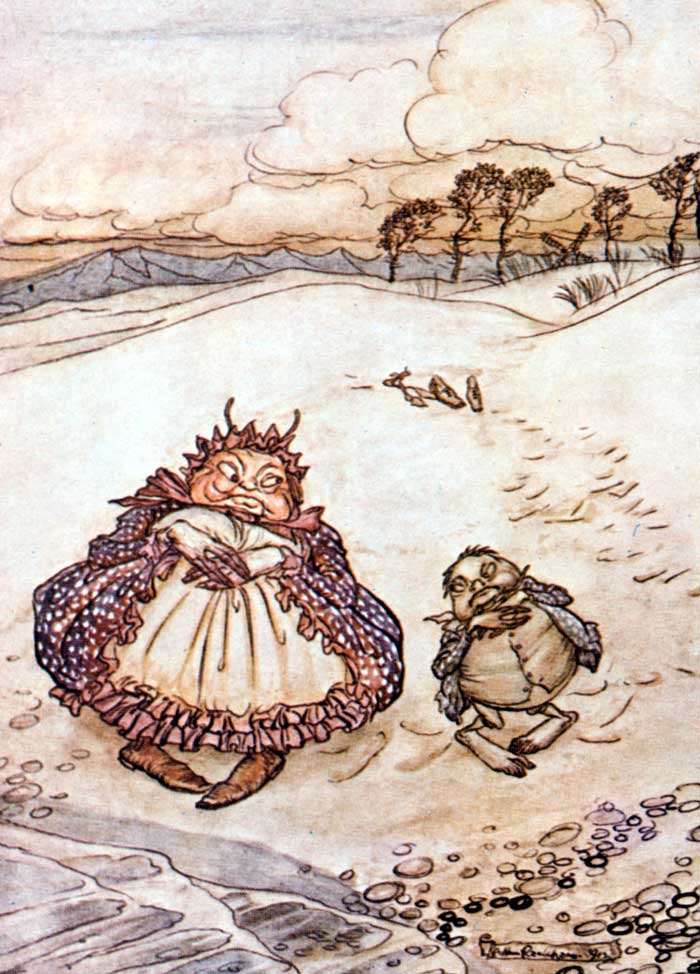1. ἀπέρχομαι ~ ἀπελεύσομαι ~ ἀπῆλθον: go away, depart
2. παιδεύω ~ παιδεύσω ~ ἐπαίδευσα: educate, teach
3. βαδίζω ~ βαδιέομαι ~ ἐβάδισα: walk, go
4. κόπτω ~ κόψω ~ ἔκοψα: strike, beat; mourn
5. δείκνυμι ~ δείξω ~ ἔδειξα: show, point out
Here are the proverbs and sayings:
Γῆ εἶ καὶ εἰς γῆν ἀπελεύσῃ.
Βλέπων πεπαίδευμ' εἰς τὰ τῶν ἄλλων κακά.
Οὔποτε ποιήσεις τὸν καρκίνον ὀρθὰ βαδίζειν.
Καιρὸς τοῦ κόψασθαι καὶ καιρὸς τοῦ ὀρχήσασθαι.
Ἀνόητος νεοττὸς ἑκὼν δείκνυσι τὴν ἑαυτοῦ νοσσιάν.
Listen at SoundCloud.
Plus some commentary:
Here is Arthur Rackham's illustration of Aesop's fable about the crabs:
Γῆ εἶ καὶ εἰς γῆν ἀπελεύσῃ.
Earth you are, and to the earth you will depart.
The passage is from the Biblical Book of Genesis; in the King James version, it reads: "Dust thou art, and unto dust thou shalt return." God originally molded Adam from the soil or dust of the earth, χοῦν ἀπὸ τῆς γῆς; here is that verse in Genesis: ἔπλασεν ὁ θεὸς τὸν ἄνθρωπον χοῦν ἀπὸ τῆς γῆς. Note that the future and aorist parts of the verb ἀπέρχομαι (ἀπο-έρχομαι) are formed from different roots: ἀπ-ελεύσομαι and ἀπ-ῆλθον.
Βλέπων πεπαίδευμ' εἰς τὰ τῶν ἄλλων κακά.
I have educated myself by observing others' mistakes.
The full form of the verb is πεπαίδευμαι, and it is a perfect verb with a nominal root: παῖς, "child." In the active, it means to teach or educate, while in the middle it means to learn. Another version reads: Βλέπων πεπαίδευμ' εἰς τὰ τῶν πολλῶν κακά, with πολλῶν, "of many," instead of ἄλλων, "of others." This is another one of the iambic one-liners of Menander:
Βλέπων - πεπαί—δευμ' εἰς - τὰ τῶν — ἄλλων - κακά.
Οὔποτε ποιήσεις τὸν καρκίνον ὀρθὰ βαδίζειν.
You will never make the crab walk straight.
This proverb is found in Aristophanes' Peace. There is an Aesop's fable related to this proverb: when a parent crab tells the child to walk straight, the child replies, "Show me how!" — and of course the parent cannot walk straight either. From the Greek root ὀρθ- we get all the ortho- words in English.
Καιρὸς τοῦ κόψασθαι καὶ καιρὸς τοῦ ὀρχήσασθαι.
There is a time to mourn and a time to dance.
The verb κόψασθαι literally means to beat or strike; in this context, it means to beat one's breast in mourning. The words come from a famous passage in the Biblical Book of Ecclesiastes. You saw another verse from this passage last week: Καιρὸς τοῦ κλαῦσαι καὶ καιρὸς τοῦ γελάσαι. For information about the Hebrew words that the Greek words of the Septuagint are translating, see Wikipedia: Ecclesiastes 3.
Ἀνόητος νεοττὸς ἑκὼν δείκνυσι τὴν ἑαυτοῦ νοσσιάν.
The foolish chick willingly points out its own nest.
This proverb seems to belong to a fable, but the fable has not survived; at least I do not know of a story that connects to this elegant little proverb. Just who did the chick lead to the nest...? A fox? A weasel? We can be sure that nothing good happened as a result, and the message for humans is clear: don't be like the foolish chick and give away information that might do you harm!
Here is Arthur Rackham's illustration of Aesop's fable about the crabs:

No comments:
Post a Comment